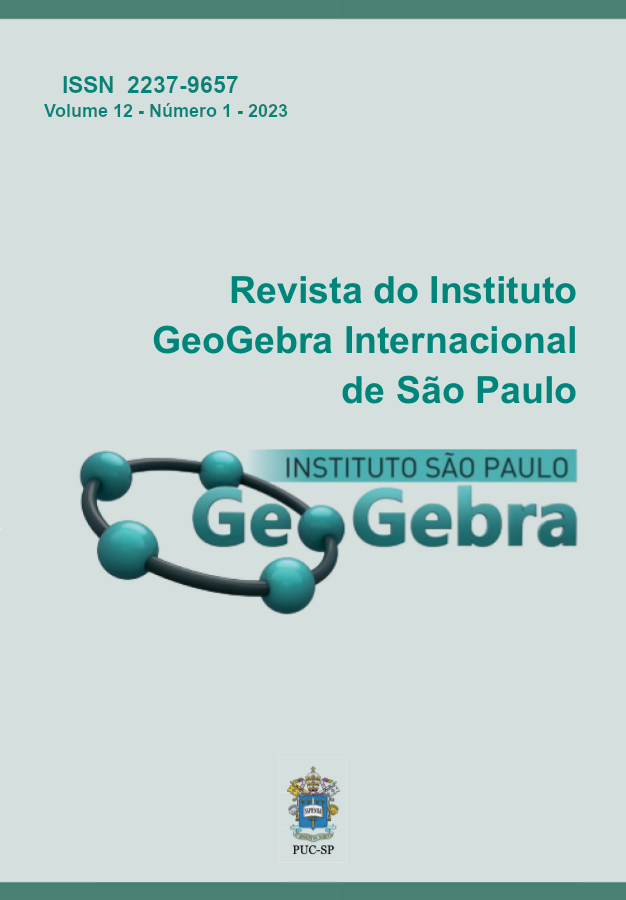A dynamic view of the Pythagorean theorem with GeoGebra
DOI:
https://doi.org/10.23925/2237-9657.2023.v12i1p062-077Keywords:
Right Triangle, Perigal’s Equicomposition, Last Fermat’s Theorem, Mathematics TeachingAbstract
We present in this work some dynamic views of the Pythagorean theorem using GeoGebra. For the manipulative experiments, we selected some demonstrations among the 370 cataloged by Elisha Scott Loomis in his work The Pythagorean Proposition, one of them being Perigal's equicomposition. We build the dynamic approaches in pages of the GeoGebra platform, accessed by external links. We conclude that GeoGebra is an excellent tool to dynamically explore the Pythagorean theorem, enabling algebraic-geometric and vector approaches.
References
BICUDO, I. Demonstração em matemática. Bolema, v. 15, n. 18, p. 79-90, 2002.
DOMINGUES, H. H. A demonstração ao longo dos séculos. Bolema, v. 15, n. 18, p. 55-67, 2002.
EUCLIDES. Os elementos. São Paulo, Unesp, 2009.
FERNANDES, F. M. Polígonos e poliedros equidecomponíveis. 116 f. Dissertação (Mestrado Profissional em Matemática em Rede Nacional - PROFMAT) – Universidade Tecnológica Federal do Paraná. Curitiba, 2018. Disponível em: http://repositorio.roca.utfpr.edu.br/jspui/bitstream/1/2972/1/CT_PROFMAT_M_Fernandes%2c%20Flavia%20Mescko_2018.pdf.
FOSSA, J. A. Introdução às técnicas de demonstração na matemática. 2. ed. São Paulo, Livraria da Física, 2009.
GEOGEBRA. GeoGebra: aplicativos matemáticos. 2022. Disponível em: https://www.geogebra.org/?lang=pt_BR. Acesso em: 01 ago. 2022.
GRAVINA, M. A. Geometria dinâmica: uma nova abordagem para o aprendizado da geometria. Anais do VII Simpósio Brasileiro de Informática na Educação, p. 1-13, 1996.
LAGO, R. C.; NÓS, R. L. Investigando teoremas de geometria plana com o GeoGebra. Revista do Instituto GeoGebra de São Paulo, v. 9, n. 3, p. 15-29, 2020.
LOOMIS, E. S. The pythagorean proposition. Washington, National Council of Teachers of Mathematics, 1968.
MEC. Base Nacional Comum Curricular. Brasília, MEC/SEB/CNE, 2018. Disponível em: http://basenacionalcomum.mec.gov.br/images/BNCC_EI_EF_110518_versaofinal_site.pdf.
NÓBRIGA, J. C. C. Demonstrações matemáticas dinâmicas. REVEMAT, v. 15, n. 1, p. 1-21, 2019.
NÓS, R. L.; FERNANDES, F. M. Ensinando áreas e volumes por equicomposição. Educação Matemática em Revista, v. 24, n. 63, p. 121-137, 2019.
NÓS, R. L.; SANO, M.; LAGO, R. C. Using GeoGebra in generalization processes of geometrical challenging problems. Revista do Instituto GeoGebra de São Paulo, v. 10, n. 1, p. 49-64, 2021.
ROSA, E. Mania de Pitágoras. Revista do Professor de Matemática, v. 1, n. 2, p. 14-17, 1983.
SILVA, J. J. da. A demonstração matemática da perspectiva da lógica matemática. Bolema, v. 15, n. 18, p. 68-78, 2002.
SETTE, P. F. A aula de matemática no projeto UCA: o GeoGebra e o teorema de Pitágoras. 213 f. Dissertação (Mestrado Profissional em Educação Matemática) – Universidade Federal de Ouro Preto. Ouro Preto, 2013. Disponível em: https://www.repositorio.ufop.br/jspui/bitstream/123456789/3475/1/DISSERTA%c3%87%c3%83O_AulaMatem%c3%a1ticaProjeto.pdf
SILVA, V. M. R. da. Uma visão dinâmica de alguns teoremas geométricos clássicos via GeoGebra. 102 f. Dissertação (Mestrado Profissional em Matemática em Rede Nacional - PROFMAT) – Universidade Tecnológica Federal do Paraná. Curitiba, 2022.
SINGH, S. O último teorema de Fermat. 17. ed. Rio de Janeiro, Record, 2010.
Downloads
Published
How to Cite
Issue
Section
License
Copyright (c) 2023 Revista do Instituto GeoGebra Internacional de São Paulo

This work is licensed under a Creative Commons Attribution 4.0 International License.
Submission, processing, and publication of articles sent to the journal and registration of the DOI at Crossref is free of charge.
Authors retain their copyright and grant the journal the right of first publication of their article, which is simultaneously licensed under a Creative Commons - Attribution 4.0 International license CC BY that allows others to share the article by acknowledging its authorship and initial publication by the journal.
The GeoGebra journal encourages its authors to register their work with information and communication management systems aimed at researchers, such as Academia.edu, Mendeley, ResearchGate, etc.


 10.23925
10.23925
